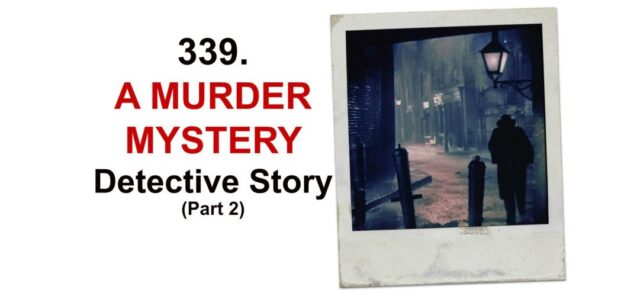Here is the concluding part of this detective story, which is based on a text adventure by Peter Carlson on www.textadventures.co.uk. In the first part you heard me playing an adventure game in which I have to analyse clues and choose the right options to continue a story and solve a murder. Before listening to this episode you should listen to part 1 of the story. Click here here to listen to part 1: https://teacherluke.co.uk/2016/03/31/338-a-murder-mystery-detective-story/ In this episode (part 2) you’ll hear the rest of the story, and if you don’t understand what’s going on – don’t worry, I’ll explain it at the end and you can read a summary of the story below. Enjoy!
[DOWNLOAD]
The Story – Explained
“Wait, wait, wait! I still don’t completely understand what happened in the story!”
OK, me neither. Let’s clarify.
Story summary (Vocabulary check: Do you know all the underlined words? Check them in a dictionary if you like – perhaps the Cambridge Online Dictionary)
- First we investigate the scene of a murder. A man has been shot dead but it’s not just a random mugging. It appears to be deeper than that.
- We work out the victim’s identity by investigating a smoke shop where he bought some Vietnamese tobacco. The owner of the smoke shop tells us the victim’s name, Mr Gaubert Bouvier, and gives us his address.
- We visit the address and discover that it has been trashed. All the objects in the house have been thrown around. Someone else has been here, searching for something. Who? It was 2 Russian brothers. Why were they searching the place? I’m not sure…
- We discover a hidden science lab where Bouvier was making bombs. It turns out Bouvier was a chemist who specialised in bomb production.
- There’s some action when we discover plans for another bomb attack in a theatre.
- We go to the theatre and it’s the first time we spot the Russians, but we don’t follow them. Again, we’ll come back to that.
- We manage to prevent the bomb from exploding and then discover that the target of the bomb was a scientist called Sir Joseph Swan. He was planning to patent and sell a new invention called the electric lightbulb. The victim of a previous explosion was also a scientist, working on the lightbulb invention. So, apparently the murderer(s) are targeting the makers of these lightbulbs.
- We investigate the whaling ship which we work out is moored in the docks. It was sailing off the coast of Belgium, but it turns now it’s moored in London again.
- Investigation of the ship tells us the navigator of the ship was sending instructions to Bouvier the victim to make bombs.
- We manage to track down the captain of the ship, who runs away from us. There’s a chase through the streets near the docks. During the chase we glimpse a man with a scar on the left side of his face, but it’s not important. We’re chasing the captain.
- We catch the captain. Why was he running? Well, it’s not because he knew about the bomb attacks. It’s for another reason – probably because the ship is involved in some other criminal activity, maybe pirating or perhaps smuggling.
- Anyway, the captain tells us the name of the navigator: Yorick Rozencrantz.
This is obviously a fake name because it’s taken from two characters in the Shakespeare play Hamlet. - We decide to investigate those two Russian brothers. We work out that they must be carpenters working on a construction site near the river, so we go to investigate them.
- After a fight with the Russians we learn that they were employed by the navigator/Shakespeare/Yorick to plant the bomb at the theatre and to trash Bouvier’s house. (I still don’t know why they trashed Bouvier’s house)
- After a bit more deductive reasoning, we later discover that the secretive navigator/Shakespeare/Yorick guy is a former French soldier who was posted in Vietnam, where France had a colony. In fact, in Vietnam he met Mr Bouvier, the victim of the murder.
- So, Bouvier and Shakespeare knew each other in Vietnam, and as a soldier Bouvier was an expert in explosives.
- With the help of a friend who is an expert on military history, you work out that the Shakespeare character is actually called Renard Voclain. We see a photo of him, and see that he has a scar below his left eye.
- Using our amazing photographic memory, or eidetic memory, we manage to remember where we saw this guy before. It turns out he was there during the chase with the captain, hiding in the crowd of Londoners.
- Our amazing memory recall and deductive reasoning tell us that he must be living near the docks, where he keeps cats. We know this because we remember seeing cat hairs on his trousers, and some other clues.
- We head to the docks and the presence of some cats leads us to the right house.
- There we discover Renard Voclain, the navigator/Shakespeare character and master criminal behind both the killing of Bouvier and the bomb attacks.
- We learn that Voclain was also trying to develop electric lightbulbs and was killing off his competitors in order to have a monopoly on the industry – not a bad idea considering the massive profits that could be made, although we know that crime doesn’t pay.
- After a quick gunfight we manage to catch Voclain, arrest him and send him to Scotland Yard where he’ll be charged and tried in front of a judge in the proper manner.
Results – Am I a Good Detective?
I got pretty average results from my detective work. (Listen to hear me read out my results)
Do you think you can do better? Try playing the game for yourself here.
If you enjoyed it, you can check out other Victorian Detective stories too (I think there are two other ones by the same author) at http://textadventures.co.uk
What do you think?
Why did the two Russian brothers trash Bouvier’s house?
Did I miss any elements of the story?
Have you played Victorian Detective yourself yet? Did you get a different narrative?
I can’t wait to read your comments. :)


